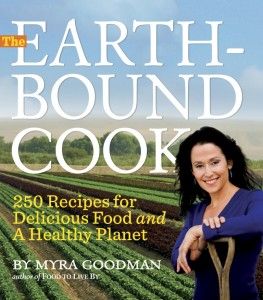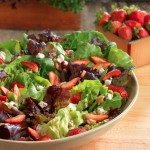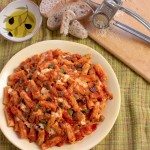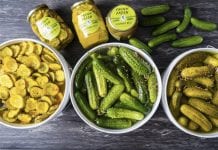Leader in the organic produce business and in sustainable farming practices, Myra Goodman inspires us with eco-tips and organic recipes with her new book The Earthbound Cook.
 By Sahar Ghaffari, LuxEco Editorial Assistant
By Sahar Ghaffari, LuxEco Editorial Assistant
Sustainable farming business woman, Myra Goodman is a popular cookbook author and co-founder of the organic Earthbound Farm, which she started in 1984 with her husband Drew. Her passion for organic foods has catapulted Earthbound Farm into the country’s largest grower of organic produce. Myra and Drew’s organic and sustainability initiatives have garnered them numerous awards and honors including Global Green USA’s Corporate Environmental Leadership Award and the Organic Trade Association’s Organic Leadership Award. As the author of two successful cookbooks, Food to Live By, and now The Earthbound Cook, Myra is spreading the message that fresh organic foods and produce are not only healthy and delicious, but vital to the sustainability of the environment.
My husband Drew and I are both from New York City and we never realized how many toxic chemicals were used to grow our food until we started farming ourselves right in our little backyard farm in Carmel Valley, CA. The farmer before us taught us how to care for the raspberry bushes by applying chemical insecticides, herbicides, fungicides and synthetic fertilizers, but we couldn’t bring ourselves to do it. We didn’t want to handle potent chemicals meant to kill bugs and weeds, or eat food grown with them, or apply them next to our home. We instinctively knew there had to be a healthier way to grow food.
As a pioneer in reintroducing organic farming into the marketplace, how do you feel about the current situation of farming? Have there been improvements in how our food is produced or is there still much to be done?
There is still so much to be done! Organic food is less than 4%of all US food sales, and only .5% of our farm land is being cultivated organically. But that is still tons more than when Drew and I started farming in 1984. I think Earthbound Farm has been a great example that organic farming is truly viable on a large scale. We have 150 growers, small and large, who together are farming more than 37,000 acres organically, which avoids the use of more than 11 million pounds of synthetic chemical every year. When I look around, I am heartened by the number of people who are taking an interest in how their food is produced and who’s producing it. Consumer demand for sustainable foods keeps growing, which in turn is encouraging a shift in production.
Is it harder to produce organically grown foods rather than using pesticides?
I think that’s because there haven’t been a huge number of medical studies that show that people get sick from eating chemically produced food, even though the connection seems clear to many of us. However, there is some science that’s starting to raise eyebrows. For example, there was the study out of Harvard and Montreal last year that showed what appears to be a connection between consumption of conventional produce and ADHD in children. And there was also the publication of the President’s Cancer Panel study last year. This landmark report by a prestigious mainstream scientific panel is recognition at the highest level that the chemicals present in our environment have direct and serious consequences for human health — especially for children, who are far more susceptible to damage from environmental chemical exposures than adults. In fact, it urges consumers to choose food grown without pesticides or chemical fertilizers, antibiotics and growth hormones to decrease their exposure to chemicals that can increase their risk of developing cancer.
I think people are also starting to learn more about the negative impacts of conventional farming on the environment, and they are understanding we humans are directly affected by the condition of our environment.
Is buying organic realistic for the average American? And what about lower income families?
Organic food is more expensive. It’s more expensive to farm organically, the shelf life of organic packaged foods isn’t extended by artificial preservatives, and we don’t rely on cheap artificial flavors and colors. Organic meat and dairy is especially expensive because costs compound the higher up on the food chain you go.
That said, if someone is committed to eating organic and is willing to adjust their diet a bit, organic food can be affordable and diets can be healthier as a result. Organic beans and grains are pretty affordable and very healthy, and produce bought at its peak season is usually the best quality and least expensive.
Eating less meat is great for personal and environmental health, and it saves money. Rediscovering the joy of cooking from scratch – for example making big batches of your own tomato sauce to eat fresh and freeze for winter when organic tomatoes are bountiful and affordable – is rewarding and incredibly delicious. I hope The Earthbound Cook inspires more of these projects.
How can parents introduce organic and healthy living to their children?
I think gardening with kids and/or visiting a farmer’s market or local farm and then cooking up the bounty with kids is the best way to get them to try and enjoy new and healthy foods. A child may not want to try Swiss chard if they see it on their dinner plate, but if they plant the seeds, weed and water and eventually harvest the chard and turn it into a quiche (or some other dish), I would bet they’ll be eager to taste it. Learning to cook, learning what’s healthy and what’s not so healthy, is a very important education that most kids aren’t getting in school and need to get in the home kitchen.
In your second book, The Earthbound Cook, you feature 250 recipes as well as tips and tricks for a healthy lifestyle, are you constantly coming up with new recipes and ideas for the organic lifestyle?
I spent two years writing that book. It’s 462 pages with hundreds of recipes, eco essays and tips, and cooking primers. I learned so much working on the book and use so many of my eco tips every day, but haven’t come up with too many new ones yet, which is great, because it gives me confidence that the book is pretty comprehensive. I am always coming up with new recipes though. I look at cooking as a creative challenge and like to use my imagination to create new recipes frequently.
What are your kitchen must-haves for an Earthbound Cook?
I am absolutely in love with my cast irons skillets, and I love my electric tea pot and my huge stack of organic kitchen towels.
What is the importance of a home cooked meal vs eating out?
When you cook from scratch you control the ingredients. You can choose organic produce, sustainable seafood, humanely raised meat. That means you can protect your health and the health of your family. I find the time spent at the dining table enjoying a home cooked meal is much longer than time spent eating “take out” or a micro-waved meal. Everyone seems to respect the meal more and want to savor it. Some of my best times with my family happen at the dinner table, and the dinner table has always been an anchor of our family.
Below you can try some of the delicious recipes from Myra Goodman’s new cookbook The Earthbound Cook!
Heirloom Lettuce Salad with Strawberries, Walnuts, and Goat Cheese















